Before I ever heard about learned helplessness applied to anything, there was a real sense of the meaning. Learned helplessness could be seen in the eyes of any living being who’d been shown by interaction with those who were in some way responsible for them that they were property, chattel or commodities. What they felt didn’t matter. They were there for the acquisition of income or power of some sort, whether large or small and they just better do what they’re told or face abuse.
That vacant expression can be seen in many homeless people, abused women and children, stray dogs and even horses, the main subject here. Yes, all of us have a heart and we can have its power stolen from us. We can learn to be helpless.
A very important part of these individuals understands that they are not willing partners to anything. They’re just slaves and very disposable. Their spirit has been stomp broke.
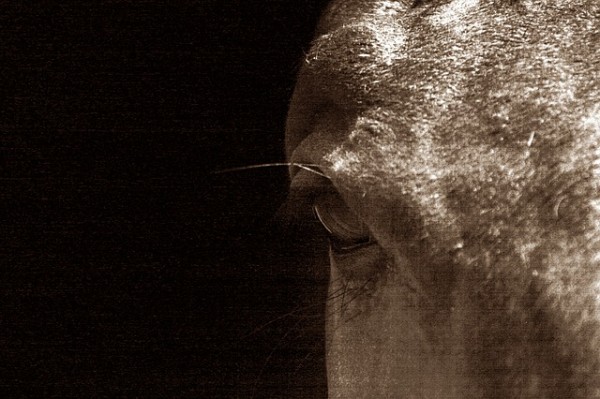
It can be seen in the horses set to be passed into the hands of the kill buyer and have usually been through a nightmare before they were dropped at the sale. Even if they’re not in bad shape, they already know there is no partnership, no savior, no happy outcome. They can feel it. The spaced out, glazed over stare tells the story.
To see that in the eyes is always heartrending for anyone who has their eyes and heart open enough to see it. It calls for action, like it does to so many of the good-hearted people who are the boots on the ground in the every day quest to bring relief to the unwanted and abused.
For anyone who shares a real heart for horses on the racetrack there are some places we won’t go. We’re generally labeled “not tough enough”. We won’t sacrifice a horse’s trust to pick up checks or to clean up at the betting window. We don’t want them running sore, risking breakdowns and we sure as hell don’t want them claimed. We’re in their hearts and they’re in ours. Egos and riches slide in that state.
I think of the story of Black Gold, a Kentucky Derby winner, whose mother Useeit ran in a claiming race where she was nearly claimed. Yeah, nearly, except that her owner, an Indian man named Hoots, showed up in the saddling enclosure brandishing a gun that he pointed at officials.
“You’re not taking my horse!”
The racing secretary looked on in shock.”You know, you’ll never run a horse in a race again!”
“I don’t care…you’re not taking my horse!”
Hoots loved little Useeit. The rest of the story takes on the look of a fairytale.
Many of us get where he was at. We’d never allow someone to take our horse, no matter what the price. The feeling that they trust us is what rules. It’s right-brained knowing on a deep rooted heart level. We wouldn’t have it, period.
The fear of having someone who trusted you succumb to learned helplessness hangs like a specter in the background.
We have known some real defiant individuals, like Decorated Streaker, who retired from a failed racing career to live with us. He’d figured out what “commodity” means. He felt it and he fought back against commodity treatment, even with all of his problems. If he trusted someone it became you and him versus them, whoever they were. Sometimes, the way he showed that was more than a little dangerous.
Quick as lightning and with twice the fury, Streak ripped the leadshank from the vet’s hand and chased the young man from the stall with his ears flattened, his eyes nearly shooting flames and his teeth bared as he took on the shape of a charging bull.
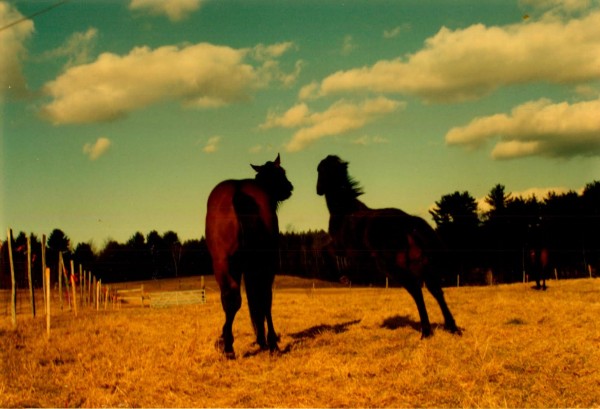
We had a vet in to float Streaker’s teeth. Before using the tranquilizer we’d requested, this young, arrogant vet was sneaking his hand up Streaker’s neck in an attempt to grab an ear. He was trying to show us how knowledgable he was about “techniques of restraint.” Streaker knew all about that crapola and he’d bury the guy first.
“Don’t touch the ears!” I shouted.
Streak would never permit a stranger access to his ears. He knew all about ear twitching. At which point the young fool made a dive for Streaker’s left ear.
Big mistake.
Quick as lightning and with twice the fury, Streak ripped the leadshank from the vet’s hand and chased the young man from the stall with his ears flattened, his eyes nearly shooting flames and his teeth bared as he took on the shape of a charging bull. With his head down Streak charged part way down the aisle as my 16-year-old son grabbed at the trailing lead shank. He halted the thoroughly torqued Streaker, calming him, then led him back to his stall. In his stall, Streak cow-kicked the wall in a final, deeply annoyed statement.
The vet had hurried out the barn door.
Outside the barn the young vet’s hands were shaking as he lit a cigarette. “I guess he doesn’t like an ear twitch.”
Gee ya’ think? Would anyone?
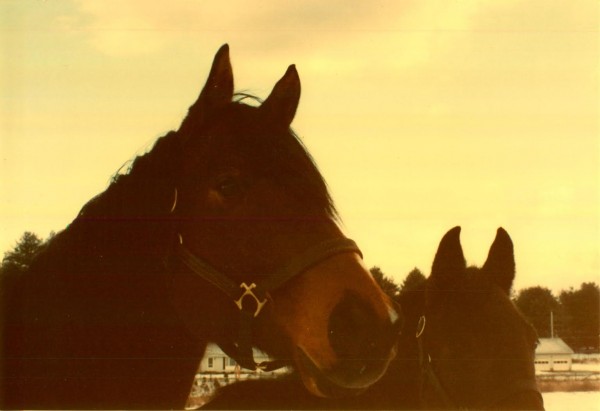
But, Streak knew we were always with him. And, he also knew who the good practitioners were.
We had a farrier named Frank for 17 years who was always kind, patient and liked to call every horse “Beauty” after seeing the movie Black Beauty. He said that it made him want to see a horse’s point of view. That yen to understand went through his hands when he put them on a horse. Our horses always tended toward being very relaxed with Frank. Certainly Streaker knew about Frank’s ways and he was very affectionate with the man. Frank never woke the dragon that slept inside of Streak. Only bullying of some kind brought that dragon out, ready to burn the threat.
No, Streaker didn’t totally succumb to learned helplessness. He’d fight any bully, but if you were his friend, he’d let you do anything. We never twitched his ears. We could rub them and scratch the insides of them in fly season—he enjoyed a good massage around them with a rub rag. We tried hard to respect how he felt. To us, he was nobility and honor and all things that were intangible.
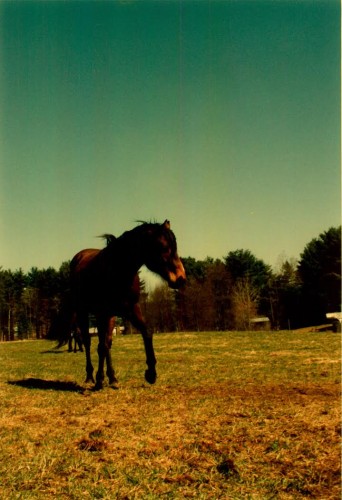
It’s a sad thing that we come from a time when horses were broke and still often are. That essentially means they have no will of their own, no spirit, no sparkle. Humans are quite used to taking that from them, bending them to human wants, needs and a dominating ego.
Nowadays, there’s a growing number of folks who do care about how horses feel about their lives with us. But much of the old way does still exist. Force and abuse are still common. Those are markers of a 6,000 (or more)-year-old patriarchy that broke people as well as every other living thing. The idea was that of a ruler who sapped the energy of all of the living beings that were perceived as below him. It went down hill to the common man on the bottom of the pyramidal society.
Us common folk were at the bottom alright, supporting the rest of it. We often passed that feeling of being on the bottom on to those that we thought were even lower than us. Subjugation and dominion were in everything we did.
That rulership is almost over now. People are awakening to their role not of dominion, but as stewards in this place. We carry the ability within those two hemispheres of our brains the gift of caring for all of life. It’s a part of the connection between mind and heart, something being studied extensively by The Heartmath Institute and other organizations who reach into esoteric studies with a fuller description of humanity and it’s place in the natural world.
We’re going home to who we truly are and horses can help us open the door to the wonder of it. They’re brutally honest, but it’s deep truth that they give us. When we get there, “learned helplessness” will no longer exist.
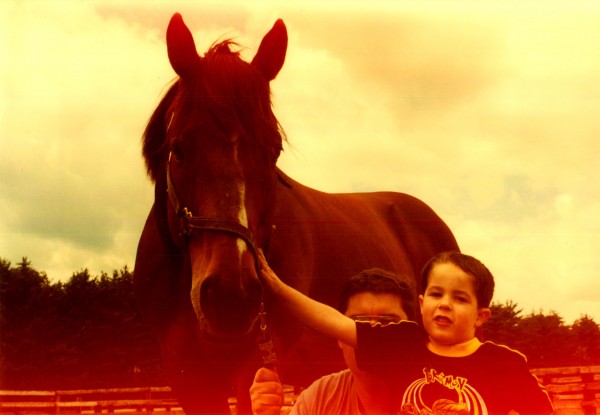
About the Author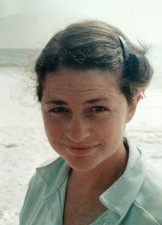
From showing English and Western, working at the racetrack and even carriage driving in New York City, C.A. Ginart has done it all. She is the author of the book, In the Absence of Fear: All Things Are Possible




 June 17, 2016
June 17, 2016 





















